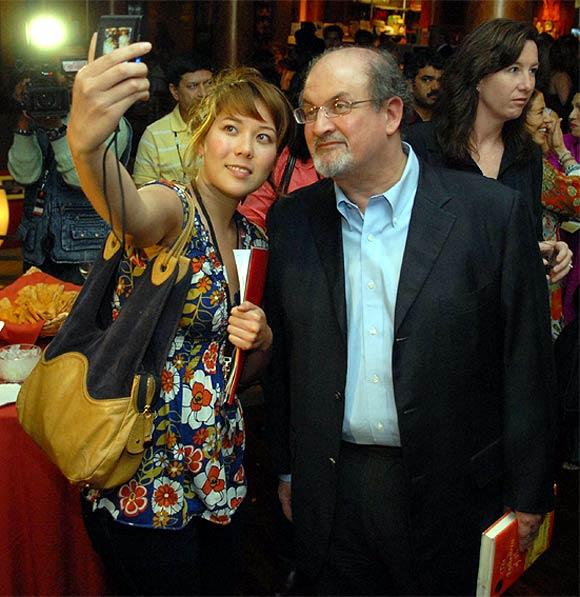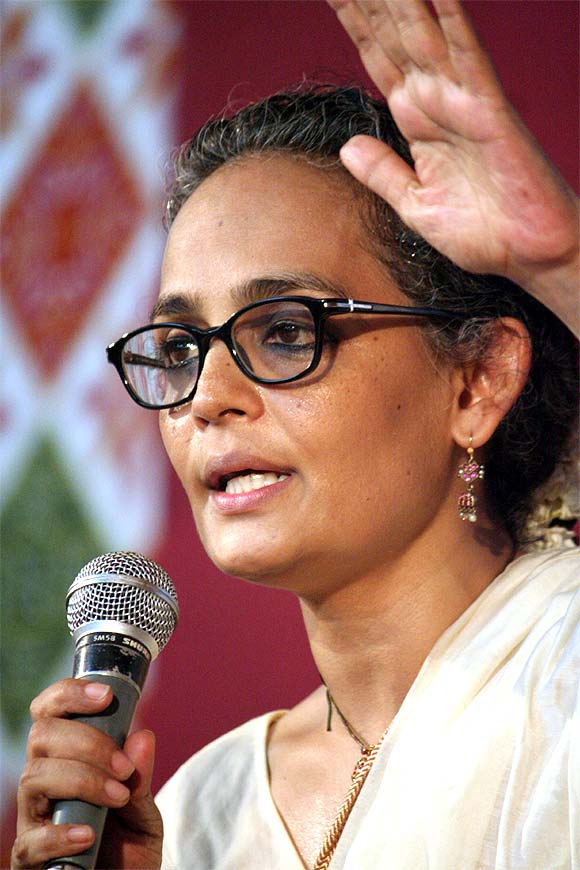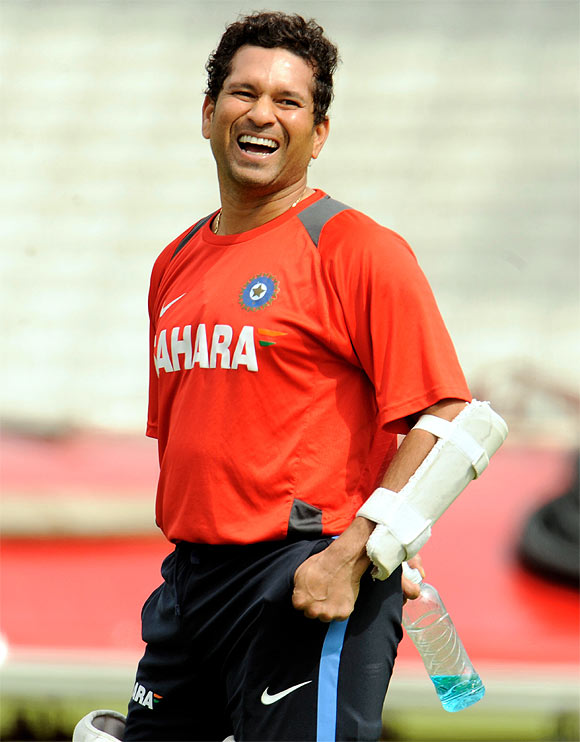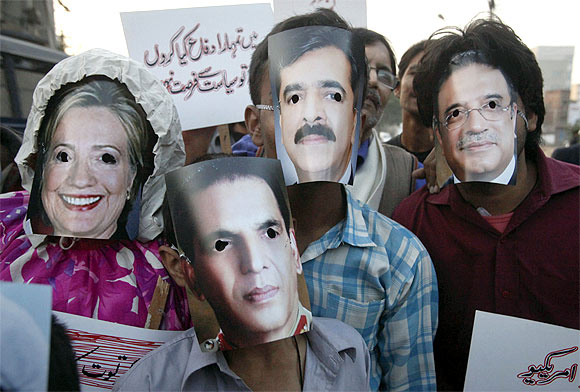Photographs: Paresh Gandhi/India Abroad Archana Masih
Mohammad Hanif, the brilliant Pakistani novelist, discusses Rushdie, Roy and being a writer in Pakistan with Rediff.com's Archana Masih.
After his debut novel A Case of Exploding Mangoes established him as one of the most exciting writers in the business, Mohammad Hanif's second book Our Lady of Alice Bhatti is a racy read about a spirited junior staff nurse, recently released from prison.
This weekend, Hanif will be a much sought after stellar attraction at the Jaipur Literary Festival, which has been more in the news this week for a section of Indian Muslims demanding a ban on Salman Rushdie's presence rather than the huge opportunity it provides Indian readers to interact with some of the world's finest writers.
At the festival, Hanif will speak about Our Lady of Alice Bhatti and discuss the theme 'The City as a Dream.'
Our Lady of Alice Bhatti is set in a squalid part of Karachi, a city Hanif returned to in 2009 with his wife and son after spending 12 years in England, employed with the BBC.
In an e-mail interview with Archana Masih, Mohammad Hanif speaks about being a writer in Pakistan, why he thinks Arundhati Roy is brilliant and how everybody at a certain age wanted to write like Salman Rushdie.
Did you grow up wanting to be like Salman Rushdie? He is a great writer, but I daresay -- do you think he is past his prime?
Everybody of a certain age wanted to write like Rushdie and so did I, but I wouldn't want being hunted around the world. I am sure even Rushdie wouldn't want that life.
The last book I read by him was The Enchantress of Florence and he seemed to be at the prime of his prime.
What are some of the things about Indian writers that you admire or dislike? Who are your 'must buy' Indian writers?
I don't see writing as a team sport, so I don't see Indian writers as an entity. I think bankers turning to writing because they think there is more money in it is an encouraging trend.
Aman Sethi and Siddharatha Deb. Manu Joseph has been promising a new novel. And obviously anything by Shamas ur Rehman Farooqi and Nayyar Masud is always a delight.
of the Hanif interview...
'I think Arundhati Roy is brilliant at what she does'
Image: Writer-activist Arundhati Roy at a meeting organised by the Committee for the Protection of Democratic Rights in MumbaiPhotographs: Uttam Ghosh/Rediff.com
Do you see yourself as a writer-journalist or has the journalist receded in the background, giving way to the writer?
Contrary to say, Arundhati Roy in India, who debuted with a Booker-winning work of fiction, and then moved into activism-journalism from locations like Kashmir and Chhattisgarh.
Do you read Ms Roy? Would you like to see another work of fiction from her?
Who doesn't read Roy?
For me it doesn't matter if she writes another novel or not. I think she is brilliant at what she does. I wish we had more people like her.
I still do journalism, mostly in Urdu and hope to keep doing it.
Three years after you returned after spending 12 years in Britain, how different has life been in Pakistan?
Do you ever regret returning to Pakistan? Does your family, especially your young son, regret the move?
Nobody really regrets living in their own country, they just wish there was more electricity and fewer bombs.
After spending more than a decade away in England, do you think writers can tell evocative stories about their homeland better than adopted countries because of the ties that bind them with the people, emotions, incidents etc of their home countries?
There are lots of writers who write about their adopted homelands, which are full of emotions and incidents and people.
I try and write because I want to escape all kinds of ties, to create my own little messed up world and then try and inhabit it for a few years.
of the Hanif interview...
'I would love to see Miandad and Tendulkar running for that impossible single...'
Image: Sachin Tendulkar during a training session before the Oval Test, London, August 2011Photographs: Philip Brown/Reuters
The last few years have seen many prominent Pakistani writers -- yourself, Kamila Shamsie, Mohsin Hamid, Nadeem Aslam, Fatima Bhutto...what is it about the Pakistani milieu that is throwing up these extraordinary talents, almost without respite?
Some of the writers you have mentioned been publishing since the last millennium. There are some new ones who are really good writers.
Journalists often ask why do Pakistani writers get so much attention, they usually ask this after paying them some attention.
Maybe we are good writers, maybe we are Pakistanis, maybe journalists can't come with new feature ideas.
Do you think there are enough stories to tell in Pakistan for you to remain a novelist all your life?
There are stories in every country, in every household. But as one of the Indian cricketers famously said in an insurance advert Jab tak balla ghoomta hai tab tak...
Has Imran Khan called you -- after the reference to him as 'a failed batsman masquerading as a bowler' in Our Lady of Alice Bhatti?
And since you mention cricket -- what would your ideal Indo-Pak playing XI be?
Imran is our great white hope. He needs all the votes he can get. He could have been easily elected as the mayor of London, but things are a bit complicated here.
Not much into fantasy leagues, but surely I would love to see (Javed) Miandad and (Sachin) Tendulkar running for that impossible single and the conversation that ensues after one of them gets run out.
of the Hanif interview...
'I worry more about what Pakistan's so-called liberal society has been doing to the country'
Image: Protestors wearing masks of US Secretary of State Hillary Clinton, Pakistan army chief General Ashfaq Kayani, Prime Minister Yusuf Raza Gilani and President Asif Ali Zardari at a demonstrationPhotographs: Mohsin Raza/Reuters
Do you ever worry about Pakistan becoming a mullah State? Where would that leave Pakistan's liberal society?
I worry more about what Pakistan's so-called liberal society has been doing to the country.
Mullah State was a bogey that has been created by liberals to hold onto their privileges.
Pakistan's army is mostly clean shaven these days and being attacked by the bearded ones.
But it really is not about facial hair, it's about bread, and land and other mundane things that most Pakistani liberals never have to worry about.
Was the stay in the hospital when your mother was ill the catalyst for Our Lady of Alice Bhatti?
It was a sad time me for and I think my brain blocked out most of it. I wouldn't call it a catalyst, but 20 years later it did give me a little glimmer of a character that I could build a story around.
The book is a riveting story of life as seen by the poor working class, one far removed from what the rich or privileged experience. What was it that drew you to this part of society, especially when more and more writers seem to be setting their books/telling the stories of the educated middle class?
I guess I have known more working class people than educated middle class ones in my life. Maybe I am just drawn to people in hopeless, miserable situations which is not to say the working class has a monopoly over misery.
I am sure you have seen a lot of miserable middle class people. In fact, they think they are middle class because they assume there is someone more miserable than them. We'll get to them in some future book.
Do you think jihadi movements thrive because of poverty, where the poor sometimes join these groups to escape poverty more than the belief that there are 72 virgins waiting for them in paradise?
I don't think there is a connection between poverty and the fantasies of world domination. Osama bin Laden, poor? That Norwegian who massacred those kids, poor? But it's always been easier to kill poor people than those not so poor.
And 72 is just a random number, thrown in for colour, like those Bollywood chorus dancers, they don't usually interfere with the plot.





article